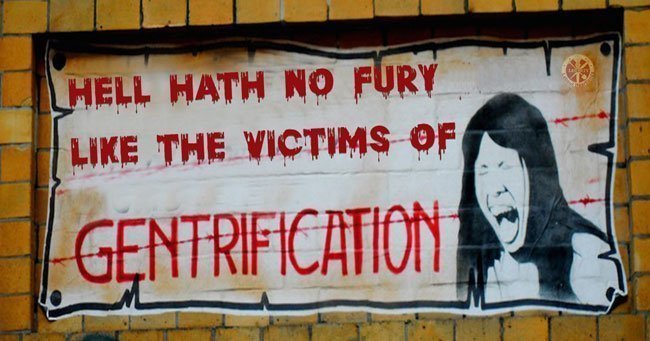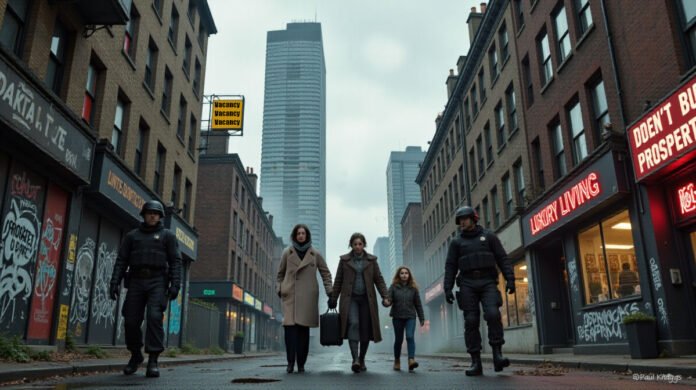The Urban Purge: Gentrification and Social Dumping in Britain’s Cities
In the shadow of gleaming glass towers and luxury developments, a silent war is being waged against Britain’s working class. Not content with mere gentrification, our cities have embarked on something far more sinister: the systematic expulsion of their poorest residents through what can only be described as social dumping.
A quarter of the way into the 21st century the 6th richest country in the world is now employing the twin forces of gentrification and social dumping to purge poorer, working-class people from their cities, leaving them displaced and disconnected from their old communities. This deliberate atomisation reduces individuals to their commodity value, prioritising profit over humanity in Britain’s cities.
The numbers are staggering: £5.2 million spent by councils to effectively uproot homeless families from their temporary accommodation and relocate them to cheaper parts of the country. But these figures only scratch the surface of a deeper human tragedy. Behind every pound spent lies a tale of upheaval—families given just 24 hours to accept relocation or face life on the streets, communities fragmented as residents are scattered like leaves in the wind, and lives systematically dismantled in the name of fiscal efficiency. For councils, it’s a cold calculation: the “undesirables” neatly erased from their ledgers, a tidy cost-saving measure in the harsh climate of austerity.

What we’re witnessing isn’t merely displacement; it’s social cleansing dressed in bureaucratic clothing. Consider the cruel irony: Islington, once transformed from working-class housing into million-pound properties through government-supported gentrification, now stands as a symbol of how completely our cities have been captured by capital. Where once the poor were at least rehoused in newly built council estates, today they are simply expelled to councils in the Northern provinces of England in a pass-the-buck exercise to already struggling with finances to meet the needs of their communities.
“And in every afflicted city, the story is the same: luxury condos, mass evictions, hipster invasions, a plague of tourists, the death of small local businesses, and the rise of corporate monoculture.”
― Jeremiah Moss, Vanishing New York: How a Great City Lost Its Soul
The machinery of this expulsion operates with cold efficiency. Companies like Reloc8 UK – paid £3 million since 2020 – function as modern-day deportation contractors, moving families from London and Birmingham to “cheaper” parts of the country. The brutality lies in the details: 24-hour ultimatums, the severance of all ties with original councils, the permanent exile from one’s community.
The use of these firms appears to have increased year on year, with a sharp rise in payments by councils in 2023 and 2024, when homelessness across England increased dramatically. When taking account of all the firms identified by the Guardian, 30% of the £5.2m sum has been paid in the past year alone.
Reloc8 UK said it had procured homes in London and Birmingham over the years but said: “there are times when certain areas are more prevalent due to availability, affordability for tenants and many other factors”.
Reloc8 UK also provides transport and removal services for relocated families as well as basic household furniture and appliances. The firm said that, at a minimum, it provides families with a brand new cooker, fridge-freezer and beds, the costs of which are paid back by councils.
The sums paid to Reloc8 UK also include incentive payments to landlords to encourage them to accept low-income tenants.
Reloc8 UK said it could not comment on individual councils’ policies, but many families had used its services to move on a voluntary basis. The firm also said councils saved about £20,000 per family over a two-year period compared with if they had remained in temporary accommodation.
London councils have made the heaviest use of these firms, paying them almost £4.8m since 2020. Waltham Forest Council alone has paid Reloc8 UK more than £900,000 since 2020.
Enfield council has paid Reloc8 UK more than £600,000 since last August alone. A report recently found Enfield was the London local authority sending families the furthest from their jobs, schools and support networks. The council has said that most of the households to which it provides temporary accommodation will end up moving out of the borough and often away from the south-east of England.
“A rat race is for rats. We’re not rats. We’re human beings.” –Jimmy Reid

The racial dynamics are particularly chilling. Dr Shabna Begum of the Runnymede Trust calls it “racialised, coercive displacement” – working-class families of colour are being forcibly relocated to predominantly white areas where many report feeling isolated and vulnerable to racism. The human cost is treated as externality, an unfortunate but necessary sacrifice to balance municipal budgets.
This is capitalism at its most naked – the reduction of human beings to inconvenient costs that must be minimized. This mass exile is enabled by a perfect storm of austerity and policy failure. Council funding has been slashed 46% since 2010. Social housing stock has plummeted by 250,000 homes in a decade. In London, only 5% of homes align with Local Housing Allowance rates, which will remain frozen until 2026. The result? Councils spend £4 million daily on temporary accommodation while paying millions more to companies that promise to make their poor residents someone else’s problem.
“Gentrification, at its deepest level, is really about reorienting the purpose of cities away from being spaces that provide for the poor and middle classes and toward being spaces that generate capital for the rich.”
― Peter Moskowitz, How to Kill a City: Gentrification, Inequality, and the Fight for the Neighborhood
Most damning is how this practice has become normalised. What began as an emergency measure has evolved into standard operating procedure. Councils speak of “private sector discharges” and “demand management” – antiseptic terms that mask the violence of forcing families to choose between exile and homelessness.

We’ve seen this before. The clearances of the Highland Scots in the 18th century, the slum clearances of the 1960s – Britain has a long history of moving its poor out of sight. But there’s a crucial difference: where once the displaced were at least rehoused nearby, today’s exiles are simply abandoned. Durham County Council reports families arriving with nothing but a key and an address, dropped into communities ill-equipped to support them. This abandonment of responsibility not only harms the displaced but also strains the already limited resources of receiving communities.
The contrast with post-war Britain is stark. Then, there was political consensus to house working-class people dignifiedly. Today, we have surrendered entirely to market forces, allowing the commodification of human need to override basic social obligations. The loss of social housing homes in the past decade isn’t a failure of policy – it’s policy working exactly as intended.
“The central cause [of gentrification] is that we’ve turned cities into capital-producing machines, and city governments have become addicted to this capital to function.”
― P.E. Moskowitz, How to Kill a City: Gentrification, Inequality, and the Fight for the Neighborhood
This is the end game of neoliberal urbanism: cities as gated communities for the affluent, where the poor are treated like contaminants to be removed. The social contract isn’t just broken; it’s being actively shredded by those charged with protecting it.
Until we recognise this crisis for what it is – a deliberate policy of class cleansing – we cannot hope to address it. The solution isn’t just more housing or higher local housing allowance rates, though these are desperately needed. What’s required is a fundamental rejection of the ideology that sees cities as profit centres rather than living communities.
It seems we are entering an age where our cities are becoming gated communities for the affluent, while the working class is scattered to the winds like unwanted debris.
But it doesn’t have to be this way…
Labour’s Missed Opportunity

Labour’s proposed solution of 1.5 million new homes, while superficially ambitious, reveals a fundamental misunderstanding – or perhaps deliberate misdirection – of the housing crisis. Rather than addressing systemic inequality, this plan appears designed primarily to feed the mortgage market, turning housing need into banking opportunity. The deregulation of planning permissions and sacrifice of green belts to development represents not progress, but a continuation of the same market-driven thinking that created our current crisis.
What Britain needs isn’t just more houses scattered across its diminishing countryside – it needs a bold vision for the future. Building a new city, designed specifically for the challenges and opportunities of the 22nd century, would do more than provide homes. It would create an economic engine driving regeneration across the entire country. This would represent the first genuine industrial strategy Britain has seen in half a century.
Imagine the cascade of opportunity: thousands of builders, architects, artists, and tradespeople employed not just in construction but in creating a living, breathing community. The ripple effects would touch every corner of the nation – from steel mills in Sheffield to furniture makers in Wales. This isn’t just about building houses; it’s about building prosperity, community, and a future that works for everyone, not just the privileged few.
Instead, we get piecemeal solutions and market-driven fixes that will only entrench existing inequalities. The tragedy isn’t just that Labour lacks the vision for such transformative change – it’s that they seem content to manage decline rather than imagine renewal.
Maybe it’s time to build a new city, one for everyone…
Support Independent Journalism Today
Our unwavering dedication is to provide you with unbiased news, diverse perspectives, and insightful opinions. We're on a mission to ensure that those in positions of power are held accountable for their actions, but we can't do it alone. Labour Heartlands is primarily funded by me, Paul Knaggs, and by the generous contributions of readers like you. Your donations keep us going and help us uphold the principles of independent journalism. Join us in our quest for truth, transparency, and accountability – donate today and be a part of our mission!
Like everyone else, we're facing challenges, and we need your help to stay online and continue providing crucial journalism. Every contribution, no matter how small, goes a long way in helping us thrive. By becoming one of our donors, you become a vital part of our mission to uncover the truth and uphold the values of democracy.
While we maintain our independence from political affiliations, we stand united against corruption, injustice, and the erosion of free speech, truth, and democracy. We believe in the power of accurate information in a democracy, and we consider facts non-negotiable.
Your support, no matter the amount, can make a significant impact. Together, we can make a difference and continue our journey toward a more informed and just society.
Thank you for supporting Labour Heartlands









